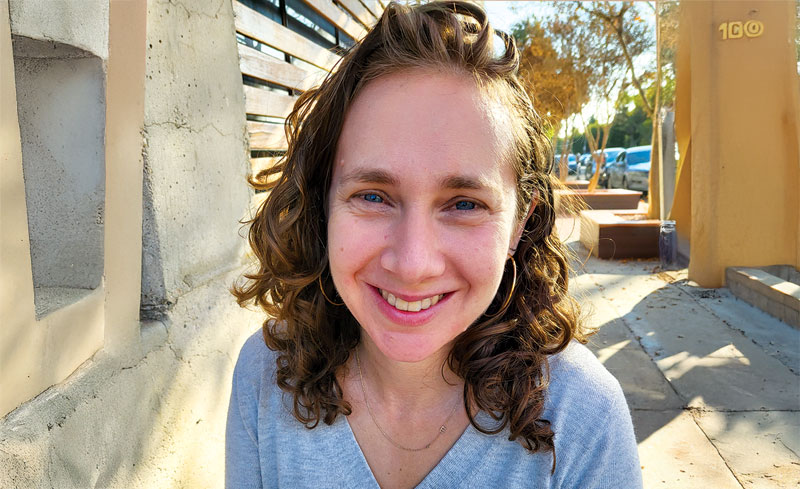Forty days before a child is born, a voice from heaven
announces: “The daughter of this person is destined for [so-and-so].” —
Babylonian Talmud, Sotah 2a
We want company. We don’t want to be alone. This is the
beginning of everything. God made a companion for Adam.
If you look at the Los Angeles Times and The New York Times
online, there’s a hotlink to personals. Pick the most obscure zip code in
Vermont, or the center of Manhattan, and see how many people are looking for
someone, anyone, and how simple, how modest are the ambitions for love.
Walking, talking, sharing movies, sharing breakfast, reading the paper, going
for a hike — and for these simple daily activities, men and women put their
faces in view of strangers and those who might know them. They do it because in
their own circle, or just in the accidental crossings of the day, no one dares
come out of the fog to say, “It’s you that I want. You for all the reasons you
want me.”
The rule of the screwball comedies is that the boy and girl
meet, have an early affection which familiarity destroys, each then sees the
other at his or her worst and then, knowing the truth about themselves and the
other — and with the victory of awareness — they consecrate a new vow. In the
screwball comedy of Genesis, it is only after eating from the tree that Adam
and Eve can be a real couple, have a real marriage.
Marriages, like movies, have a structure. In my
psychotherapy practice, I have heard many scripts that went like this:
Act One:
You’ve Found Your Beshert
SHE: (Liltingly) You like hard pears too?! That’s amazing!
HE: You want me to pick you up at the airport at 3 a.m.? How fun!
SHE: Sex for the third time tonight? Absolutely!
HE: I love the way she speaks so slowly!
SHE: I just love the way he clears his throat all the time!
HE: I can’t believe I’ve lived my whole life without
snorkeling!
TOGETHER: I can’t believe we might never have found each
other!
Act One is both cosmic and chemical. Like your own baby,
your beloved is uniquely alluring, beautiful, charming, pure of soul. This is
not rational. The phrase is “falling in love” for a reason. Your reaction is
like a drug, a chemical action to ensure continuation of the species and the
tribe. You believe that you’ve known this person all your life because, in a
sense, you have. The idealized loved one embodies the best of what you’ve had —
in a parent, a beloved tanta or a sixth-grade English teacher who cherished
you, who gloried in your specialness — and all you ever longed and wished for
from a critical, cold or clueless parent. Your partner is on a pedestal, and
you are in a giving mode. Your similarities are magnified, you delight in your
differences.
Act Two:
The Drug Wears Off
Or, as the psychologists say, “Recognition of differences
sets in.”
SHE: You voted for that evil man? You stopped at McDonald’s
on the way home before dinner? You ate a cheeseburger there? That throat
clearing is getting a little annoying. You call your parents every day? Those
are your friends? Those are your parents?
HE: Could you say that a little faster? You’ve never read
“Doonsbury?” You never call your parents? Taxi drivers are meant to do 10 p.m.
airport pick-ups, not boyfriends. If humans were meant to swim underwater, God
would have designed them with little plastic breathing tubes already attached.
All right, so it’s not as perfect as it seemed at first, but
there’s hope. Together, you can create a new little perfect person, someone to
love without reservation. Someone who likes any kind of pears you feed him.
Act Three:
We Are Parents
SHE: (Scornful, impatient) You let her go to the park in her
party shoes? You want to have sex when we could be getting some sleep? You got
all those groceries and you forgot the one thing I sent you for? And this is 2
percent milk, not 1 percent milk. What do you mean she said she didn’t need a
jacket so you let her go without one? She is 4 years old and you are 40.
HE: You keep saying you want me to be involved in raising
Nicole and Sam, but you criticize every decision I make. Just forget it.
Like Titania in “A Midsummer Night’s Dream,” you’ve awakened
to see that Bottom is an ass.
Act Four:
You Write the Ending
Yes, 50 percent of first marriages end in divorce. But 50
percent don’t. What do we know about those that make it through? Living in
reality is hard, but living in fantasy is worse. The movies really trip us up.
Our culture oozes seductive popular myths about marriages. If you want a shot
at not being part of the half that doesn’t make it, beware — be very aware — of
falling for these myths:
1. We should always think alike, enjoy the same things and
be happy together. Romance should last forever. Intimacy is warm and fuzzy.
2. If you really loved me, you would know what I think
without me having to say it. If I take a risk and tell you what I want and
feel, I’m entitled to get what I want from you.
3. You should know what I like sexually without me telling
you. You should never fantasize about anyone else. We should have the same
level of sexual desire at the same time.
4. Our children are more important than our marriage.
5. You should make up for everything I never had in
childhood, rid me of existential doubts and provide all meaning of life.
Judaism is a religion of deed, not creed. Rather than grand
declarations of love we are encouraged — in fact commanded — to work hard to
create shalom bayit (peace in the home). But how?
Moses Maimonides knows that we can only form a union if we
first separate from our own parents. In his 12th-century work, “Laws of
Marriage,” he writes, “A husband can prevent his wife’s family from entering
the house if it bothers him. She can make the same demand on him.”
But beyond that first crucial separation, shalom bayit must
come through deeds. We show our love through small, daily acts of respect and
enthusiasm. We don’t necessarily do for our spouse what we want our spouse to
do for us. Instead, we do what honors our spouse most.
Torah teacher Shira Smiles recommends that you get off the
telephone when your spouse enters the house or the room you’re in. If you’re at
home when your spouse arrives, go to the front door to greet him or her.
Instead of turning on the television, take your spouse for a walk around the
block.
Marriage has great potential for boredom, chronic resentment
and misery. It also has a greater potential for deep satisfaction, intimate
friendship and sexual pleasure than any other adult relationship. Consider your
marriage as another child. It, too, needs care. You started out together, and
after the children leave you’ll be alone together again.
The movies tell us to believe in love. But the Hebrew word
emunah, Smiles teaches us, is not merely “belief” or “blind faith,” but a
commitment or faithfulness based on actual knowledge.
The best way to keep marriage from being too hard is not to
believe for a second that it’s easy. Take time, act wisely, guard your words,
get help before you need it: You write the ending.






















 More news and opinions than at a Shabbat dinner, right in your inbox.
More news and opinions than at a Shabbat dinner, right in your inbox.